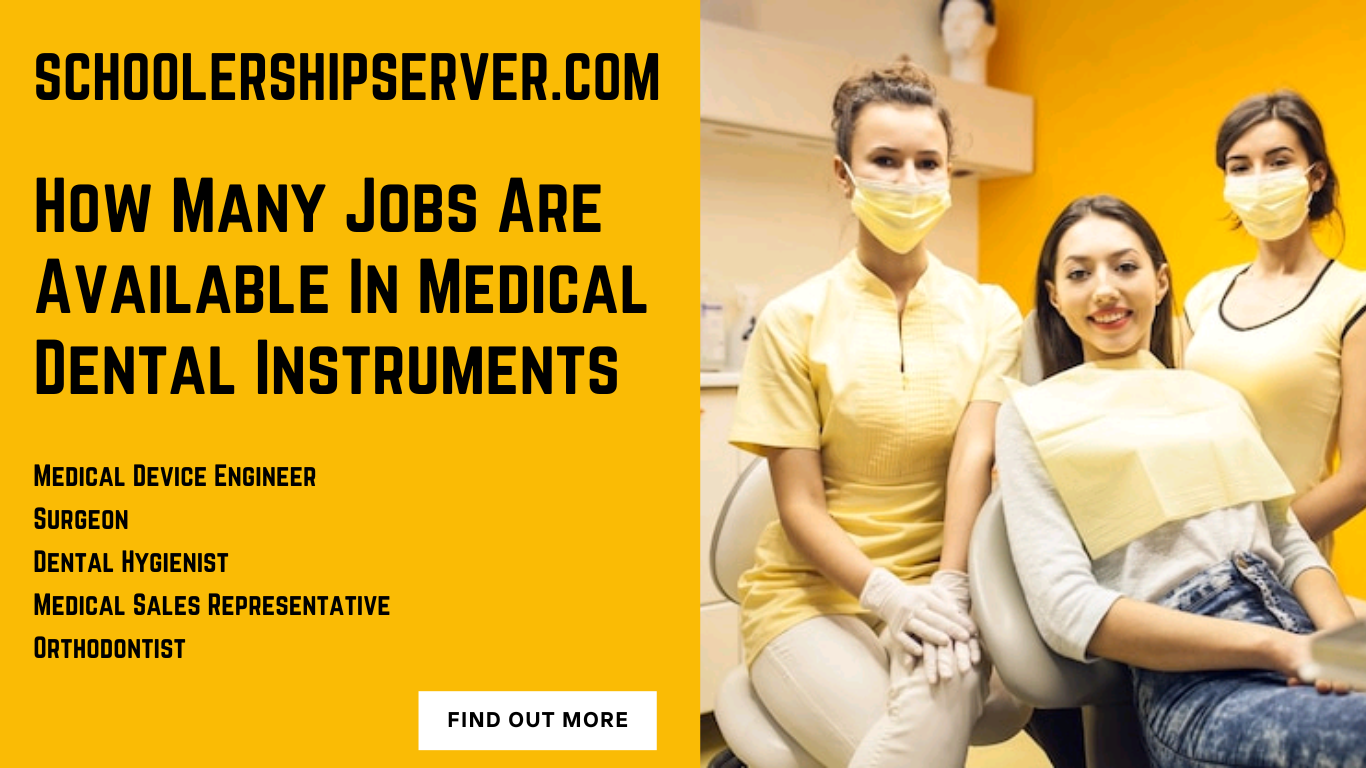How Many Jobs Are Available In Medical/Dental Instruments {Best Paid Jobs With Updated 2023 Salary}
- Medical Device Engineer
- Orthodontist
- Surgeon
- Medical Instrument Sales
- Quality Assurance Engineer
- Production Assembler
- Medical Supply Technician
- Entry-Level Dental Technician
- Warehouse Worker
- Repair Technician
- Audiologist
- Nuclear Medicine Technologist
- Respiratory Therapist
- Chiropractor
- Sterile Processing Tech
- Optometrist
- Medical and Dental Instrument Sales Manager
- Medical Device Sales Representative
- Clinical Research Associate
- Medical Device Regulatory Affairs Specialist
ALSO CHECK ???????? 20 Top Paying Jobs In Investment Managers
10 Best Paying Jobs In Public Utilities {Top Paid Jobs In Public Utilities With Best Salary In 2023}
How Many Jobs Are Available In Basic Industries {10 Best Jobs In Basic Industries}
How Many Jobs Are Available Jobs In Capital Goods {2023 Best Paying Jobs With Updated Salary}
Is Medical/Dental Instruments A Good Career Path? {Find Out 10 Best Paying Jobs In Medical/Dental Instruments}
Of course Yes, a career in medical/dental instruments is a good career path. Medical/dental instruments are growing rapidly, with a huge demand for medical devices. This increase is expected to grow by 5.7% from 2020 to 2030. According to statistics, it was recently reported that the increase is being driven by several factors, which comprise the aging population of humans, the rising of chronic diseases, and also the development of new technologies.
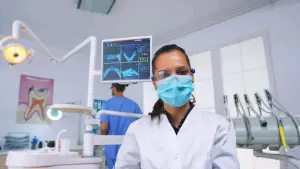
If You Are Interested In A Career In Medical/Dental Instruments, The Below Is What You Need To Do
- You need to get a bachelor’s degree in biomedical engineering, mechanical engineering, electrical engineering, or a close field.
- You also need to have experience through internships or co-ops.
- You also need to gain Network with professionals in the industry and Stay up-to-date on the latest trends in medical technology.
Benefits Of Pursuing A Career In Medical/dental Instruments
It Has High Salaries: The median annual salary for biomedical engineers was $91,410 in 2021, and it is rapidly increasing in this 2023, this was according to the Bureau of Labor Statistics
It Has an Increase In Job Growth: The Bureau of Labor Statistics projects that employment of biomedical engineers will grow 7% from 2020 to 2030, faster than the average for all occupations.
Jobs Are Stable: The healthcare industry is vital to the world economy, and jobs in medical/dental instruments are usually stable.
Jobs Advancement: There are many jobs for advancement in the medical/dental instruments field, this implies that biomedical engineers can move to management or research without going for their studies…
What Are Medical/Dental Instruments
Medical and dental instruments are equipment and devices used by healthcare personnel in the field of medicine and dentistry to examine, diagnose, treat, and perform various procedures on patients. These instruments are designed to aid in the accurate assessment, intervention, and management of medical and dental conditions. They play a crucial role in ensuring the delivery of safe and effective healthcare.
ALSO CHECK ✅ Is Public Utilities A Good Career Path? {10 Best Paying Jobs In Public Utilities}
Is Basic Industries A Good Career Path? {Best Answer And Best Jobs In Basic Industries}
Is Capital Goods A Good Career Path? {20 Best Paying Jobs In Capital Goods}
Is Auto Parts OEM A Good Career Path? {2023 Best Paying Jobs In Auto Parts OEM}
Medical and dental instruments are essential to the healthcare sector because they help physicians, nurses, and dentists identify, treat, and prevent a wide range of medical and dental diseases. Personnel who care can accurately and effectively treat their patients because of these gadgets’ carefully designed and precise engineering. These tools are essential for sustaining a person’s health and well-being, whether during routine check-ups or difficult surgical procedures.
Various medical specialties, including general medicine, surgery, cardiology, obstetrics and gynecology, orthopedics, and more are used in medicine. These tools might be very different in terms of their size, design, and function to accommodate the unique needs of each medical treatment. Stethoscopes, blood pressure cuffs, thermometers, scalpels, forceps, syringes, surgical scissors, and diagnostic imaging tools including X-ray machines and ultrasound scanners are a few of the often used medical instruments.
ALSO Check ????Is Other Specialty Stores A Good Career Path? {20 Best Paying Jobs In Other Specialty Stores To Consider}
In medicine, dental professionals use a specific set of tools to analyze, identify, and address oral health problems. Dental tools are specifically made for use inside the oral cavity, and using them properly calls for specialized knowledge and expertise. For procedures including oral examinations, teeth cleaning, cavity filling, extractions, and root canals, dentists use tools like dental mirrors, probes, excavators, scalers, drills, forceps, and dental radiography equipment. Technology innovations have transformed the design of dental and medical instruments, resulting in more advanced and effective instruments.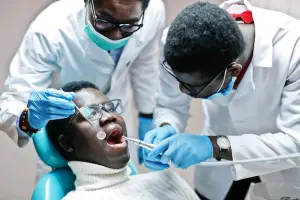
For instance, digital imaging systems have replaced traditional X-ray films, enabling instant image acquisition and enhanced diagnostic capabilities. Minimally invasive surgical techniques have also driven the development of specialized instruments like laparoscopic tools and robotic surgical systems, enabling surgeons to perform complex procedures with smaller incisions, reduced trauma, and faster recovery times for patients
Quality control and sterilization are vital aspects of medical and dental instruments used to ensure patient safety. Sterilization protocols, including thorough cleaning and disinfection, are rigorously followed to prevent infections and cross-contamination. Instruments are often made from high-quality materials such as stainless steel or titanium, which offer durability, corrosion resistance, and ease of sterilization.
In the United States, regulatory bodies such as the Food and Drug Administration (FDA) oversee the safety and effectiveness of medical and dental instruments. They ensure that these instruments meet strict quality standards and adhere to guidelines that promote patient safety. Additionally, healthcare professionals in the U.S. receive extensive training on the proper use, handling, and maintenance of these instruments to ensure optimal patient care and outcomes.
Reason Why medical dental instruments is a good career path
.1. Huge Demand For Jobs And Its Stability: The dental industry is massively growing, and there is a huge demand for dental instruments because people need dental care. So, there will be a need for skilled individuals who can manufacture, maintain, and repair dental instruments. The huge demand can provide job stability and security in one’s career.
.2. Huge Technological Advancements: The field of dental instruments is constantly evolving with new technologies and innovations and this is the main reason why medical instruments are good career paths. As a professional in this field, you will have the opportunity to work with advanced equipment and stay up to date with the latest advancements. This can make your work interesting and challenging.
.3. It Has Enormous Contribution to Healthcare: Dental instruments play a crucial role in ensuring quality dental care. By working in this field, you will be contributing to the overall health and well-being of individuals. Your work will directly impact the ability of dentists to provide effective treatments, diagnose dental conditions accurately, and improve patient outcomes.
.4. Variety of Jobs: A career in medical dental instruments offers a variety of roles and opportunities. You can work in instrument manufacturing companies, dental clinics, dental laboratories, research, and development, or sales and marketing of dental instruments. This flexibility allows you to explore different areas of interest and find a role that aligns with your skills and preferences.
.5. Transferable Skills: The skills you develop in the dental instruments field can be transferable to other related industries, such as medical instruments or biomedical engineering. This can open up additional career opportunities and provide flexibility in your professional journey.
What Do People Working In Medical Dental Instruments do:
Design New Medical And Dental Instruments. Designing medical instruments is in the engineering department of medical instruments. Designing involves understanding and creating what the healthcare professionals and patients want as well as the latest technological advancements.
Manufacturing Medical And Dental Instruments. This requires expertise in materials science, machining, and other manufacturing processes.
Testing: it involves the testing of medical and dental instruments to ensure that they meet safety and performance standards.
Marketing And Selling Medical And Dental Instruments To Healthcare Providers And Patients.
It has to do with Providing customer service for medical and dental instruments. This may involve troubleshooting problems, providing training, or issuing replacement parts.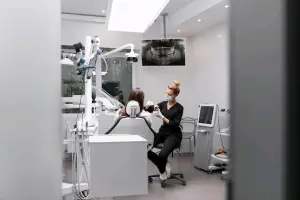
What Are The Best Paid Jobs In Medical/Dental Instruments || How Many Jobs Are Available In Medical/Dental Instruments
- Medical Device Engineer
- Surgeon
- Dental Hygienist
- Medical Sales Representative
- Orthodontist
20 Best Paying Jobs In Medical/Dental Instruments
- Medical Device Engineer
- Orthodontist
- Surgeon
- Medical Instrument Sales
- Quality Assurance Engineer
- Production Assembler
- Medical Supply Technician
- Entry-Level Dental Technician
- Warehouse Worker
- Repair Technician
- Audiologist
- Nuclear Medicine Technologist
- Respiratory Therapist
- Chiropractor
- Sterile Processing Tech
- Optometrist
- Medical and Dental Instrument Sales Manager
- Medical Device Sales Representative
- Clinical Research Associate
- Medical Device Regulatory Affairs Specialis

Highest Paying Jobs In Medical/Dental Instruments
- Medical Device Engineer
- Monthly Salary: $15,000 To $20,000
- Job Description: Medical device engineers are those who design, develop, and test medical devices. They work with numerous materials, which include plastics, metals, and electronics. They also work with a variety of software programs to design and test their devices.
- Orthodontist
- Monthly Salary: $10,000 To $15,000
- Job Description: Orthodontists are dentists who specialize in straightening teeth. They use numerous equipment and techniques to move teeth into their proper alignment.
- Surgeon
- Monthly Salary: $10,000 To $15,000
- Jobs Description: Surgeons are doctors who perform surgery. They work with several tools and techniques to operate on patients.
- Medical Instrument Sales Representative.
- Monthly Salary: $5,000 To $10,000
- Job Description: Medical instrument sales representatives sell medical devices to hospitals, clinics, and other healthcare providers. They educate potential customers about the benefits of their products and help them choose the right products for their needs.
- Medical Device Quality Assurance Engineer
- Monthly Salary: $5,000 To $10,000
- Job Description: Medical device quality assurance engineers ensure that medical devices meet safety and quality standards. They test devices, review documentation, and investigate complaints.
- Production Assembler
- Monthly Salary: $3,000 To $5,000
- Job Description: Production assemblers assemble medical devices. They follow instructions to assemble devices according to specifications.
- Medical Supply Technician
- Monthly Salary: $3,000 To $5,000
- Job Description: Medical supply technicians order, store, and distribute medical supplies. They also track inventory and prepare orders for shipment.
- Entry-Level Dental Technician
- Monthly Salary: $2,000 To $3,000
- Job Description: Entry-level dental technicians assist dentists with a variety of tasks, such as preparing patients for surgery, making dental impressions, and fabricating crowns and bridges.
- Warehouse Worker
- Monthly Salary: $2,000 To $3,000
- Job Description: Warehouse workers receive, store, and ship medical supplies. They also maintain inventory records and prepare orders for shipment
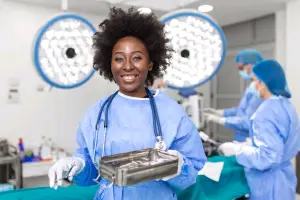
FAQ
What Instruments Are Used In Dentistry
Dental Mirrors: Dental mirrors are used to reflect light into the mouth so that the dentist can see inside the teeth and gums.
- Probes: Dental probes are used to measure the depth of decay and to explore the root canals of teeth.
- Scalers: Scalers are used to remove plaque and tartar from teeth.
- Curettes: Curettes are used to smooth the surfaces of teeth after scaling.
- Excavators: Excavators are used to remove decay from teeth.
- Filling instruments: Filling instruments are used to place fillings in teeth.
- Drills: Drills are used to remove decay and prepare teeth for fillings.
- Handpieces: Handpieces are used to hold drills and other dental instruments.
- Anesthesia needles: Anesthesia needles are used to numb the area around the teeth before dental procedures
- Suction tips: Suction tips are used to remove saliva and water from the mouth during dental procedures.
What Are the Most Important Dental Instruments
The most important dental instruments are those that are used to diagnose and treat dental problems. These include dental mirrors, probes, scalers, curettes, excavators, filling instruments, drills, handpieces, anesthesia needles, and suction tips.
What Instruments Are Used In Root Canal
Root canal instruments are used to clean and shape the root canals of teeth. These instruments include files, reamers, and irrigating needles.
What Are Three Classification Of Dental Instruments
Dental instruments are an essential part of the dentist’s toolkit. They are used to diagnose and treat a variety of dental problems, and they help to ensure that patients receive the best possible care. Dental instruments can be classified into three main categories:
Hand instruments: These instruments are held in the dentist’s hand and are used to perform a variety of tasks, such as examining teeth, removing decay, and placing fillings.
Powered instruments: These instruments are attached to a dental handpiece and are used to perform tasks such as drilling and polishing teeth.
Surgical instruments: These instruments are used to perform surgical procedures, such as extracting teeth and placing implants.
How Many Jobs Are Available Steel/Iron Ore? {2023 Best And 10 Highest Jobs To Consider}
How Many Jobs Are Available Jobs In Capital Goods {2023 Best Paying Jobs With Updated Salary}
20 Best Paying Jobs In Medical/Dental Instruments {Top Paid Jobs With Updated 2023 Salary}
20 Best Paying Jobs In Medical/Dental Instruments {Top Paid Jobs With Updated 2023 Salary}
